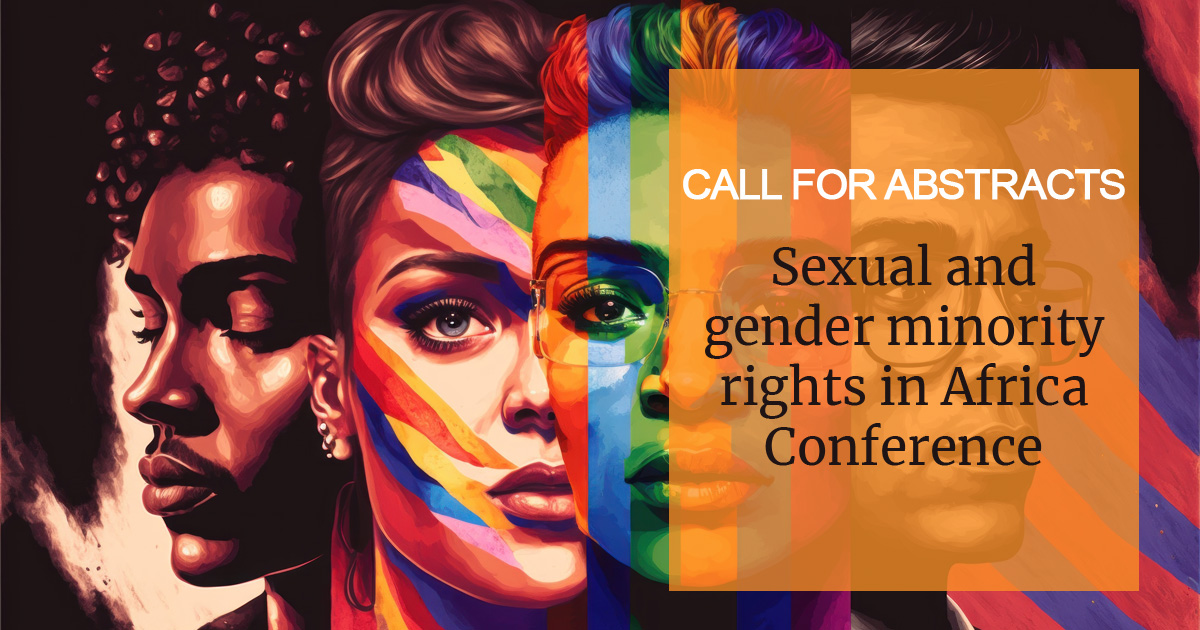Decriminalisation of anti-sodomy laws in an increasingly hostile environment in Africa
23 November 2023
The Centre for Human Rights, University of Pretoria, is convening a conference on sexual and gender minority rights in Africa under the theme decriminalisation of anti-sodomy laws in an increasingly hostile environment on sexual and gender minority rights in Africa. The aim of the conference is to critically analyse how anti-sodomy laws can be decriminalised under the prevailing hostile legal and political environment against sexual and gender minority rights in Africa. The conference will be held in hybrid format on 23 November 2023 in South Africa and online. It is anticipated that papers presented at this conference will be reworked by authors and submitted to be part of an edited book on decriminalisation of Anti-sodomy laws in Africa.
Background
Sexual and gender minorities in Africa continue to face serious human rights violations in different forms, such as discrimination and violence. The legal and political environment for advocacy towards decriminalisation and recognition of sexual and gender minorities as equal sexual citizens on the continent has become more hostile over the years. This hostility and anti-rights rhetoric has grown despite the recognition of sexual orientation and gender identity as prohibited grounds of discrimination under international law and the adoption of Resolutions 275 and 552 by the African Commission on Human and Peoples’ Rights (African Commission). The continent is experiencing a trend of new laws which adversely impact on the rights of not only sexual and gender minorities as individuals but the advocacy space and opportunities as well. Recently, Uganda passed the Anti-Homosexuality Act that has stiffened the punishment for consensual same-sex sexual conduct between adults. Ghana has passed a similar legislation and political leaders in other countries like Zambia are pushing for their states to follow with such anti-homosexuality laws. The current trend of unconstitutional changes of government on the continent also pose a threat on sexual and gender minority rights in light of the growing anti-rights movement and hostile attitudes towards sexual and gender minorities. At regional level, the African Commission has rejected the application for observer status of three civil society organisations which have a full or partial focus on sexual and gender minority rights in Africa. The reason for the rejection is that sexual and gender minority rights are not part of the rights protected in the African Charter on Human and Peoples’ Rights. With the introduction of anti-homosexuality laws in some African states and the stance of the African Commission, the legal and political opportunity structure and environment for decriminalisation has become much harder in the specific jurisdictions and across the continent.
Relying on national constitutional frameworks, the African Charter on Human and Peoples’ Rights and other international instruments, the upcoming conference seeks to examine strategies for decriminalisation specifically in the face of the hostile legal and political environment currently prevailing in Africa.
Participants
The conference seeks to bring together stakeholders interested in promoting the rights of sexual and gender minority rights in Africa, including sexual and gender minority rights activists, scholars, social scientists, policymakers, lawyers, media practitioners, religious and/or traditional leaders and human rights defenders.
Possible topics to consider
Grounded on the need for decriminalisation and the protection of sexual and gender minorities in the prevailing hostile environment in Africa, possible topics to consider include but are not limited to the following:
- Countering the effects of the Anti-Homosexuality Act in Uganda and Ghana on sexual and gender minority rights in Africa.
- Strategies for decriminalisation in the face of new anti-homosexuality laws in Uganda, Ghana and other African states with similar hostile legal environments.
- Strategies to prevent the introduction of new anti-homosexuality laws in other countries in Africa.
- Withdrawal and denial of observer status by the African Commission on Human and Peoples’ Rights to civil society organisation that have a full or partial focus on sexual and gender minority rights focus.
- Strategies for using Resolution 275 as a litigation and advocacy tool in the face push back and anti-rights rhetoric against sexual and gender minority rights in Africa.
- How ali-parliamentarians can be mobilised to repeal anti-sodomy and other laws that negatively impact on the rights of sexual and gender minorities.
- The role of scholarship and research in advancing the rights of sexual and gender minorities in the prevailing hostile environment in Africa.
- Advocacy and mobilisation against the anti-rights and anti-gender movement in Africa.
- The role of National Human Rights Institutions in decriminalisation and the prevention of new anti-homosexuality/ sodomy laws.
- The possible impact of unconstitutional changes of government on sexual and gender minority rights in Africa.
- Building positive media narratives on sexual and gender minority rights in an increasingly hostile legal and political environment in Africa.
- The role of religious and/or traditional leaders in shifting social attitudes towards sexual and gender minorities.
As part of underscoring the importance of multi-sectoral responses and partnerships in the production of knowledge, we particularly encourage joint abstracts between scholars, policymakers and sexual and gender minority rights organisations.
Submission specifications
Abstracts should be sent in English or French with a word length of 400-450 words in MS Word format (not PDF).
Abstracts must include in a single document:
- Title of abstract
- Author’s name
- Affiliation
- E-mail address
Abstracts must be sent by email to Landilani Banda at the following email address
landilani.banda@up.ac.za
Submission deadline for Abstracts: 29 September 2023.
Authors will be notified by 6 October 2023 whether their abstract has been accepted for presentation at upcoming conference.
Submission deadline for Presentations: 30 October 2023.
Authors whose abstracts are accepted will be required to submit their full presentations by 30 October 2023. All queries regarding the papers should be directed to landilani.banda@up.ac.za
The Centre will cover the cost for flights, accommodation and meals during the upcoming conference.
All queries regarding the conference in general should be directed to

Tel: +27 (0) 12 420 3151
ch.vanderlinde@up.ac.za


